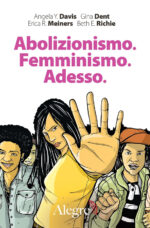Beth E. Richie is Head of the Department of Criminology, Law and Justice and Professor of African American Studies at The University of Illinois at Chicago. The emphasis of her scholarly and activist work has been on the ways that race/ethnicity and social position affect women’s experience of violence and incarceration, focusing on the experiences of African American battered women and sexual assault survivors. Dr. Richie is the author of Arrested Justice: Black Women, Violence and America’s Prison Nation (NYU Press, 2012) which chronicles the evolution of the contemporary anti-violence movement during the time of mass incarceration in the United States and numerous articles concerning Black feminism and gender violence, race and criminal justice policy, and the social dynamics around issues of sexuality, prison abolition, and grassroots organizations in African American Communities. Her earlier book Compelled to Crime: the Gender Entrapment of Black Battered Women, is taught in many college courses and is cited in the popular press for its original arguments concerning race, gender and crime. Dr. Richie’s work has been supported by grants from The Robert Wood Johnson Foundation, The Ford Foundation, and The National Institute for Justice and The National Institute of Corrections. She has been awarded the Audre Lorde Legacy Award from the Union Institute, The Advocacy Award from the US Department of Health and Human Services, and The Visionary Award from the Violence Intervention Project and the UIC Woman of the Year Award. Dr. Richie is a board member of The Institute on Domestic Violence in the African Community, The National Network for Women in Prison, A Call To Men and a founding member of INCITE!: Women of Color Against Violence. In 2013 she was awarded an Honorary Degree from the City University of New York Law School and in 2014 she was appointed as a Sr. Advisor to the NFL to work on their domestic violence and sexual assault prevention program.
-
Abolizionismo. Femminismo. Adesso
18,00 € iva inclusaL’aggettivo abolizionista affonda le sue radici nel diaciannovesimo secolo durante la lotta afroamericana contro la schiavitù. Ispirandosi a quella stessa storia questo libro collettivo ha come bersaglio l’attuale sistema penale, da sempre strutturalmente incline alla violenza razzista e di genere. Pur rispettose del fatto che abolizionismo e femminismo continuano a essere teorizzati separatamente da numerose analisi e movimenti, le autrici considerano l’abolizionismo più forte se mette in discussione i meccanismi che generano la violenza di genere e il femminismo, a sua volta, più potente e incisivo se capace di discostarsi dalle posizioni che non fanno i conti con la violenza riprodotta e amplificata da carceri e polizia. La proposta è quella di un femminismo abolizionista, con un approccio che fa tesoro della tradizione del femminismo nero e contesta l’essenzialismo di genere, che ha la tendenza a considerare la

